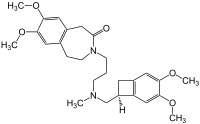Ivabradine Is…
a “cardiotonic” agent mostly used to reduce symptoms of chest pain and heart failure by reducing the heart rate via inhibition of the pacemaker current. It’s used off-label in postural orthostatic tachycardia syndrome (POTS) to reduce the excessive hearts rates POTS patients experience during standing. It appears to be unique in its ability to affect heart rates without affecting other aspects of cardiovascular functioning such as blood pressure..
Ivabradine is called Corlanor in the U.S., Procoralan (worldwide), Coralan (in Hong Kong, Singapore, Australia and some other countries), Corlentor (in Armenia, Spain, Italy and Romania), Lancora (in Canada) and Coraxan (in Russia and Serbia).
POTS Patients on Ivabradine
Doctors On Ivabadine
Dr. Grubb, a dysautonomia specialist who participated in the first tilt table tests ever said at the 2018 Dysautonomia Conference that Ivabradine has a 75% success rate: very unusual for POTS.
It’s been available as a heart failure medication in Europe for years. Amgen apparently bought up rights to it in the U.S., got it approved for heart failure in 2015, and then jacked up the price significantly to $4,500 for a year’s supply. Grubb said many of his patients are getting it from Canada. Stephanie in the U.S. reported that InHouse Pharmacy – a company she’s had good success with – will be selling Ivabradine (Ivabradid) for $1.00 per tablet for 90 tablets as of early February 2021.
Postural Orthostatic Tachcyardia Syndrome (POTS) Studies
Ivabradine is clearly a drug that’s begging for a good randomized trial. Thus far two prospective open-label trials, three retrospective cohort studies, and eight case reports have examined its efficacy in POTS. All have been successful but none are large or rigorous enough for prime time.
A June 2018 review concluded that Ivabradine lowered HR and provided symptomatic relief of POTS without affecting blood pressure. A 2018 retrospective analysis found Ivabradine (0.1 mg/kg twice daily) improved symptoms in almost 70% of adolescents.
A 2015 study on just eight patients found Ivabradine (7.5 mg) significantly slowed their heart rates both at rest and during tilt without producing significant adverse effects. That study noted that beta-blockers (propanolol, atenolol) can slow the heart rate in POTS as well, but often at the cost of increased fatigue, sleep disorders, and impotence. Those side-effects are apparently not a problem with Ivabradine.
A 2010 case series found the drug reduced symptoms in 55% and fatigue in 70% of POTS patients. The study found a low dose formulation (2.5 mg od) the most effective for most patients. The study suggested that Ivabradine may be more effective in some people when taken in conjunction with midodrine or fludrocortisone.
Ivabradine was also effective in a disorder which mimics POTS called vasovagal syncope where an exaggerated sinus rhythm and elevated heart rate can occur.
As of 2018 a small POTS Ivabradine trial (n=20) underway at the University of San Diego was underway.
Long COVID
A case report indicated that Ivabradine “produced substantial improvement in …exercise tolerance and energy levels” as well as a reduction in both supine and standing heart rate a young long COVID patient who met the criteria for POTS.
Side Effects
Side-effects are usually milder than with beta-blockers. The most common side effect appears to be an enhanced brightness in the visual field which usually shows up about 40 days after starting the drug and usually resolves. Other side effects can include slow heart rate, altered heart rates, dizziness and blurred vision.
At the 2020 Dysautonomia International conference Dr. Rowe reported he’d seen no long term side effects from Ivabradine.
More on Ivabradine From Health Rising





